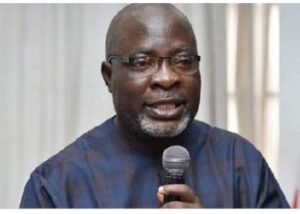Ex-Presidential Candidate Critiques Tinubu’s Leadership as ‘Civilian Dictatorship’
Ex-Presidential Candidate Critiques Tinubu’s Leadership as ‘Civilian Dictatorship’

Alhaji Yahaya Ndu, a former presidential candidate for the African Renaissance Party, has launched a scathing attack on President Bola Ahmed Tinubu’s economic strategies, branding them “thoughtless” and detrimental to Nigeria’s financial health. In a recent interview with FIRST CLASS GISTS, Ndu accused the current administration of pushing many Nigerians into severe poverty due to its policies.
Ndu intensified his criticism by describing Tinubu’s governance as a “civilian dictatorship,” revealing his deep dissatisfaction with the current political climate. He called for a more participatory approach to addressing the nation’s issues, asserting that democracy should involve active engagement from citizens beyond just voting.
Highlighting a disconnect between the government and the citizens, Ndu pointed out that the combined votes for Tinubu and other major candidates like Peter Obi, Atiku Abubakar, and Rabi’u Kwankwaso in the last elections represent less than 20 percent of Nigeria’s population. He argued that while some believe Tinubu deserves time to implement changes, this viewpoint is misleading, given that his party has held power since 2015.
Ndu stated, “To say he just started facing these challenges is disingenuous, as he has been part of the ruling party and its leadership for years.” He emphasized that the President and his inner circle should not mislead Nigerians into thinking he is new to the issues at hand.
He expressed skepticism about Tinubu’s ability to address the country’s problems, suggesting that he either lacks solutions or is not acting in the nation’s best interest. Ndu recalled how during the campaign, Tinubu often avoided direct questions, leaving others to speak for him.
Ndu lamented the lack of mass participation in democracy, arguing that a collective effort is essential for progress. He proposed that solutions for Nigeria’s challenges should involve collaboration among experts in various fields, including technology and healthcare.
On the contentious issue of fuel subsidy removal, Ndu criticized this decision as the worst of Tinubu’s administration, stating that it was executed poorly. He suggested that instead of hastily eliminating the subsidy, the government should have engaged and regulated local refinery operators to improve the situation.
Ndu concluded by asserting that if other African countries, like Libya, can sell fuel at significantly lower prices, then Nigeria must rethink its policies. He called for a comprehensive approach to addressing the country’s economic issues, stressing that collaboration and inclusivity are key to moving Nigeria forward.
TRENDING SONGS
 NPMA Appeals to Nigerian Government for Compensation After Lagos Market Fire
NPMA Appeals to Nigerian Government for Compensation After Lagos Market Fire
 Rest Every Four Hours, FRSC Issues Safety Guide for Fasting Motorists
Rest Every Four Hours, FRSC Issues Safety Guide for Fasting Motorists
 NNPC Boss Ojulari Bags UK Energy Institute Fellowship
NNPC Boss Ojulari Bags UK Energy Institute Fellowship
 Shock in Anambra: Bride Disappears Moments Before Wedding
Shock in Anambra: Bride Disappears Moments Before Wedding
 Nigerian Woman Returns ₦330 Million Accidentally Credited to Her Account
Nigerian Woman Returns ₦330 Million Accidentally Credited to Her Account
 APC Don Reach Morocco?’ VeryDarkMan Reacts to Seyi Tinubu Poster
APC Don Reach Morocco?’ VeryDarkMan Reacts to Seyi Tinubu Poster
 Bride Breaks Down in Tears as Wedding Meals Were Kept Secretly While Guests Go Home Hungry
Bride Breaks Down in Tears as Wedding Meals Were Kept Secretly While Guests Go Home Hungry
 Odogwu by Day, Robber by Night: How Marriage Joy Turned Into Tragedy
Odogwu by Day, Robber by Night: How Marriage Joy Turned Into Tragedy
 Nigerian Officials Allegedly Pocket N4–6B Weekly Through Smuggling Cartels at Seme–Badagry Border
Nigerian Officials Allegedly Pocket N4–6B Weekly Through Smuggling Cartels at Seme–Badagry Border
 Ahmad Yerima: Naval Officer to Face No Sanctions After Clash with Wike – Matawalle
Ahmad Yerima: Naval Officer to Face No Sanctions After Clash with Wike – Matawalle
Share this post with your friends on ![]()













